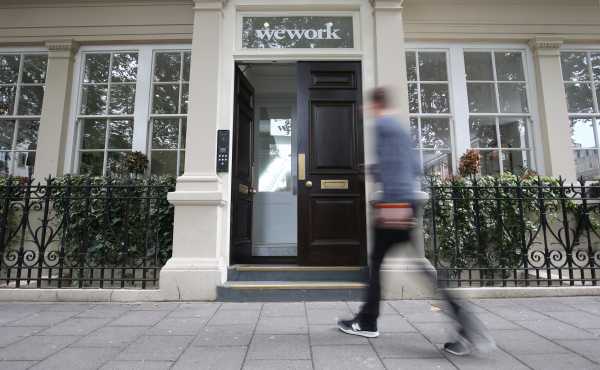
This story is part of a group of stories called

Uncovering and explaining how our digital world is changing — and changing us.
The coworking company WeWork’s newly unveiled public filings raise a question: What does it even mean to be a tech company these days?
WeWork, which leases office space to people and businesses, is valued at a whopping $47 billion — more than 10 times its bigger rival IWG, which is considered a real estate company but does the same thing. A “tech company” like WeWork, the rationale goes, is more valuable because it is bigger, faster, stronger, and will bring in more future profits for shareholders.
“If you’re going to raise capital, it’s an easier way to get your foot in the door by saying you’re some new kind of disruptive tech company,” Paul Condra, lead emerging technology analyst at research firm PitchBook, told Recode.
That’s why WeWork went to great lengths in its filings to point out all the things that make it a tech company and, by extension, validate its price tag. It has purchased lots of other tech companies and brings that technology to bear on its regular operations by “scanning technologies and software to automate the design and construction layout of any given space,” applying “data science to compare new buildings with similar proven locations,” and using machine learning to “forecast demand for each building to set the opening day price and optimize on a real-time basis.”
It also boasts 1,000 tech employees out of 12,500 total employees.
But does that make it a tech company?
Ultimately, WeWork’s main business involves leasing buildings on a long-term basis, remodeling and styling them so they feel like trendy places to be, and then subleasing space in those buildings to people and companies on a short-term basis. It looks a lot like a real estate company.
But it’s certainly not alone in having tech aspirations. Startups of every stripe are touting their tech bona fides.
Are direct-to-consumer brands like Glossier (makeup) and Away (luggage), where you purchase goods online but otherwise don’t interact with technology, tech companies? Amazon and Etsy, which primarily function as online marketplaces — are they tech? What is it that makes Tesla a tech company but not General Motors? GM uses plenty of technology and is even making competing, autonomous electric cars.
Airbnb? DoorDash? Blue Apron? Uber? Lyft? Sweetgreen? The list goes on, as does the justification. As many have noted before me, every company is a tech company — or at least thinks it is. Katrina Lake, the CEO of clothing recommendation company StitchFix told Recode’s Kara Swisher, “if you want to be relevant 10 years from now, every company is going to be a tech company.”
“The first question is, ‘Does the company sell tech?’ That’s easy. If yes, that’s a tech company,” Condra said. “If they don’t, then you have to ask yourself, ‘Is there some kind of modern technology core to its customer acquisition or customer retention?’”
But as technology becomes increasingly central to companies’ businesses, that line becomes harder to draw.
“Twenty years ago, if the internet was an important part of a business — I’d say, ‘yes, that’s a tech company,’” Jay Ritter, a finance professor at the University of Florida who tracks IPOs, told Recode. “But today, what company has a business where the internet isn’t an important part of it?”
He added, referring to other IPO researchers he’s talked with over the years, “We all agree that companies like WeWork or Etsy, whether you classify them as a technology company or not is definitely a judgment issue.”
For plucky entrepreneurs aspiring to found tech companies, that leaves many ways in. You don’t necessarily need to sell or develop technology as your main line of business. Simply using technology does the trick, and the more buzzwords you can fit in a pitch deck — AI, machine learning, data mining, blockchain — the better. Hiring engineers and software developers helps, too.
Or perhaps being a tech company is more of a mindset: We are new and we use the internet, therefore we are tech. It’s certainly a branding tool. But the distinction can feel mind-numbing.
In 2011, prominent tech venture capitalist Marc Andreessen penned a widely read Wall Street Journal article, “Software Is Eating the World” that made the prescient point that software companies would take over a large portion of the economy. These days, it feels like it’s eating our brains.
One part of the equation, however, is clear: The bigger a startup’s valuation, the bigger the payout to company shareholders — and the bankers underwriting these IPOs in the first place. Also, tech companies are buzzy and are growing in popularity among regular investors who assume big tech equals big profits. If it’s tech, people are more likely to buy what you’re selling.
WeWork stands to gain billions of dollars by emphasizing one smaller aspect of its overall business. Why wouldn’t it call itself a tech company?
Real-world effects of calling everything tech
What a company calls itself might seem immaterial, but it actually has significant repercussions.
“It is semantics, but to the degree that it affects investors’ perception, it does matter,” Ritter told Recode.
Calling everything tech can mislead investors into thinking a stock might have value and growth that it doesn’t.
“There’s no question there are people that are becoming layperson investors in these companies under the misapprehension that they are tech companies, but would never invest in real estate or a taxi company,” Anil Dash, CEO of Glitch and host of the Vox tech podcast Function, told Recode.
“At a consumer level, it masks a lot of flaws and faults because we have such a culture of optimism around tech,” he said.
WeWork is the latest beneficiary of that optimism but also the target of skeptics, who accuse it of masquerading as a tech company without having the margins or growth potential that such companies usually bring.
Valuing a company at multiples higher than its peers also means that a company has more money to play with, giving it a distinct advantage over its peers. It can afford to charge its customers less and pay its employees more as it builds its business.
At first blush that may seem like a great deal. But prices are what they are for a reason. Eventually, venture capital money will run out and shareholders will demand to see profits.
By then, an over-valued company could have run its competitors into the ground. They can then charge whatever they want.
Perhaps most deleterious to society is that tech companies don’t always have to abide by the same regulations as their non-tech counterparts.
Tech companies like Facebook and Google that were able to expand rapidly in a low-regulation environment have had unintended consequences on the world that we’re only just beginning to reckon with. Now, a new crop of tech companies like Uber and Airbnb are interfering with much more tangible goods.
“It can take a formerly boring industry and wrap it in tech and make that thing seem exciting and profitable, yet screw up a lot of the basics that legacy companies got right or were regulated to get right,” Dash said. “It would be foolish to not think these companies have some of the same shortsightedness.”
For Uber, that’s meant unvetted drivers and unsafe conditions for passengers. For Airbnb, it’s meant driving up the longterm rental prices in some areas and giving renters a platform for being racist against guests. (WeWork is mostly a real estate company and it does have to follow building regulations — that means the company’s potential impacts, which include raising rents and upsetting traditional commercial real estate models, may not be as dire.)
“Algorithms are skewing the content we read, but also skewing zoning laws and who has access to mass transit and other fundamental things,” Dash said. “The effect is more profound.”
The tech designation can also hurt the companies using them.
Straddling multiple industries can make it difficult to attract investors, especially if those investors only specialize in and understand one side of the business, PitchBook’s Condra said.
“You could think of it as a diverse play, but it’s going to be a complicated story for people to understand.”
A more technical definition
When companies file paperwork with the Securities and Exchange Commission, they have to pick an industry. WeWork chose “Miscellaneous Business Services” at the top of its public filings but still proceeded to make a lengthy case about why it’s a tech company.
That designation, however, is only used on the basis of assigning review responsibility at the SEC, so it should have a negligible effect on the company.
Perhaps the most objective criteria for judging what counts as a tech company comes from the S&P Dow Jones Indices. The company, jointly responsible with MSCI for developing the Global Industry Classification Standard (GICS) for categorizing companies, determines a company’s sector based on the revenue of its “principal business activity.” The S&P Dow Jones Indices also take into consideration “earnings and market perception” when deciding what a business’s sector should be.
Craig Lazzara, managing director of S&P Dow Jones Indices, told Recode the sector a company gets assigned doesn’t affect how a company performs.
“Our designation is intended to reflect what the market recognizes as the business the company is in, it’s not intended to create that perception,” he said.
WeWork doesn’t yet have a sector.
There are a total of 11 economic sectors that together make up the S&P 500, a measure of the health of the country’s biggest companies and, by extension, the economy. Since the S&P 500 is weighted based on the value of the companies within it, tech companies have made up an increasing share of the index’s overall value.
Interestingly, in 2018, S&P moved companies like Facebook, Twitter, Netflix, and Google out of ““Internet Technology” and into the newly named “Communications Services” sector, which houses the likes of Verizon and AT&T.
“That simply reflected changes in the economy since the initial GICS sectors were set up,” Lazzara said. “As telecoms consolidated into fewer companies, at the same time other means of communication became available. It made sense to reclassify.”
From that standpoint, some of the core companies we consider tech aren’t even tech — at least as far as S&P’s methodology.
And maybe that’s where we’re headed. What was once new and shiny technology is now a mainstay of our economy.
As Ritter put it, “In the long run, whatever business it’s in, it depends on a company’s ability to execute and generate revenue and profit.”
Sourse: vox.com






